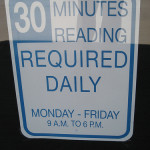Summer is right around the corner and a long held tradition in the public library community is summer reading programs. Synonymous with youth and young adult services, summer reading is worth the revisit by adults.

Science fiction is a gateway
I believe there is a positive correlation between reading science fiction novels and genuine interest in emerging technology. When I was younger, I loved science fiction and fantasy. My interests range from A Princess of Mars to The Hitchhikers Guide to the Galaxy. The Twilight Zone was a mark of my childhood. What I read and watched informed my psyche and furthered my interests in futuristic technology that modern humans could only dream of. The bottom line is that these books sparked an interest. Almost all tech heads I know love science fiction and fantasy. Not everyone is into books, but most science fiction films are based on alternate worlds created by authors like Isaac Asimov and Philip K. Dick. Authors of science fiction and fantasy push the envelope on physics, technology, psychology and history. These novels take place in the “future”, a fictional past or serve as social commentary. They can are cautionary tales or impetus for the reader to become proactive in current affairs. I’m sure no one wants to live in a world similar to Pat Frank’s Alas, Babylon.
A few suggestions for your reading list
In 2011 NPR published a fan-selected list of the top 100 science-fiction and fantasy books for summer reading. While selecting the best science fiction/fantasy book of all time may be a point of contention amongst staunch fans, the point in doing so is impractical.
I went ahead and selected my favorites from NPR’s list as suggestions for summer reading. There are a few that are on my personal reading wish list and many are on my re-read wish list. Which eager reader doesn’t have a wish list?
The classics:
If you went to high school in the United States, you were probably forced to read these. You probably had to analyze the themes, tone, characters, etc. As a result the mere mention of them is trite, but they more than deserve their place on this list.
1984 by George Orwell
Fahrenheit 451 by Ray Bradbury
Brave New World by Aldous Huxley
Slaughterhouse-Five by Kurt Vonnegut
Frankenstein by Mary Shelley
The epics:
Some of the best science-fiction/fantasy books are based in an infinite universe so that they require reader commitment and the ability to lift a ten pound book. Though your eyes may be weary, you won’t be at a loss for the possibilities that are illuminated through the text.
The Lord of the Rings by J.R.R. Tolkien
Dune by Frank Herbert
Foundation by Isaac Asimov
A Game of Thrones by George R.R. Martin
The Giver by Lois Lowry (not on NPR’s list)
A Princess of Mars by Edgar Rice Burroughs (not on NPR’s list)
Notable mention:
Do Androids Dream of Electric Sheep? by Philip K. Dick
The Andromeda Strain by Michael Chrichton
The Gunslinger (The Dark Tower Series) by Stephen King
Outlander by Diana Gabaldon
1632 by Eric Flint
The Body Snatchers by Jack Finney
Now that I’ve performed my reader’s advisory, what’s on your summer reading list? If you have any recommendations, reply to this post to share with others.